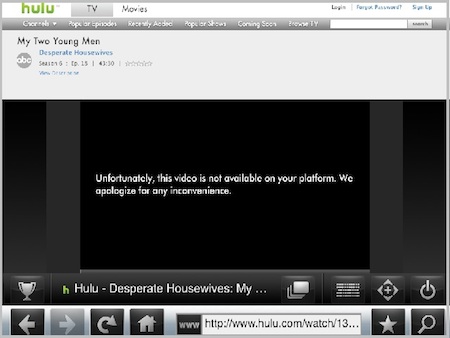-
Kylo TV Browser Can Now be Tweaked to Watch Hulu
Hillcrest Labs, maker of the Kylo browser, which lets users browse the Internet on their TVs, is announcing the Kylo 0.7 beta release this morning. The new release includes updates allowing advanced users to change the browser's user agent string in order to view Hulu. Just two months ago, when Kylo was introduced, Hulu very quickly blocked access, just as it had when boxee tried delivering Hulu to TVs. The new workaround represents another step in the cat-and-mouse game that Kylo is playing with Hulu.
browser's user agent string in order to view Hulu. Just two months ago, when Kylo was introduced, Hulu very quickly blocked access, just as it had when boxee tried delivering Hulu to TVs. The new workaround represents another step in the cat-and-mouse game that Kylo is playing with Hulu.
In the press release, Dan Simkins, Hillcrest's CEO and founder said, "It remains our position that Kylo is simply a Web browser based on open-source Mozilla code, like Firefox. We fully respect the rights of content owners and aggregators, and as such, we do no deep link, re-index, divert users past ads, or overlay different user interfaces on video players. However, we believe consumers should be able to use the Kylo browser to visit any site on the Web on the display screen of their choice. Our hope is that a respectful dialog with Hulu will encourage them to consider changing their policies."
To my knowledge Hulu hasn't ever publicly addressed this situation and I'm guessing it's won't this time either. It is extremely likely that Hulu will once again block Kylo, as it seeks to enforce its computer-only viewing model. As I wrote last week in "5 Reasons Google TV Looks Like a Winner," this insistence is really backing Hulu into a corner marginalizing the site for users who just want to watch whenever, wherever they'd like.
Aside from the Hulu tweak, Hillcrest is also announcing new features including a Windows Media Center plug-in, auto-hide control bar, improved zoom, keyboard hiding, multi-screen support for Mac, printing and updated links. Hillcrest is also putting its Loop pointer on half-price sale of $49 through June 11th. The Loop lets you easily navigate Kylo.
What do you think? Post a comment now (no sign-in required).Categories: Aggregators, Technology
Topics: Hillcrest Labs, Hulu, Kylo
-
Is Hulu Now Blocking Access for Kylo Users? Yes, It Is.
No sooner did I post "With New Kylo Browser Convergence is Another Step Closer" this morning, than I've come to understand that Hulu programs are now not accessible through the Kylo browser. Hulu worked completely fine for me yesterday, but now when I go to watch a program on Hulu, I'm getting the text message, "Unfortunately this video is not available on your platform. We apologize for any inconvenience." Huh, what's going on here? Is Hulu blocking Kylo users' access to its programs? I've asked Hulu for a comment.
If Hulu is indeed doing this, it's a PR fiasco in the making for the site. Blocking access to its content would mean that Hulu is putting itself on the wrong side of convergence and risking turning off its users (not to mention censoring as if this were China). The episode recalls February, 2009, when Hulu demanded that boxee turn off access to Hulu at the request of its content partners. That tempest highlighted the artificially made quagmire that Hulu's owners find themselves in - eager to have Hulu boost their programs' viewership, so long as it remains on the computer and not on the TV.
With Kylo, Hulu will once again be called upon to justify how it's making decisions. For example, if I'm using Kylo on my computer, how is watching Hulu content any different than if I were using IE, Firefox, Safari, etc? And if I choose to connect my computer to a TV screen, how is that any different than if I connected it to a large monitor? In short, this is a hairball for Hulu.
Update: Hillcrest Labs, the company behind the new Kylo browser, has confirmed that Hulu is indeed preventing its content from being shown. The statement from Hillcrest's CEO Dan Simpkins:
"We have confirmed with Hulu that they are preventing the Kylo browser from playing Hulu videos. Prior to our formal launch, Hulu videos would play within the Kylo browser. Like Internet Explorer, Firefox or Safari, the Kylo browser is simply a Web browser that enables consumers to visit any site on the Web. We have tremendous respect for Hulu, and we hope that a continued dialog might influence their thinking."
Meanwhile Hulu seems to be in a bunker. I haven't heard back from them, nor has anyone else it appears. I have confirmed from ABC (one of Hulu's owners) that it found out about Hulu's action when everyone else did, which means that ABC is not the instigator here. Much more on this story as it unfolds.
Update 2: Now Tuesday morning and still no word back from Hulu. Nobody else seems to have heard from them either. It looks like their PR strategy is avoidance. That's a bad move because going mum just means that story continues to live (just ask Tiger).
Hulu's decision to block Kylo users is all about preventing Hulu viewership from migrating to TVs, which would undermine broadcast network economics. That's because Hulu, with its light ad load, still hasn't been able to prove its business model. The problem for Hulu - and the networks - is bigger than Kylo though as the push toward convergence between online video delivery and TV is going to be relentless (lots more on this tomorrow). Hulu is facing an escalating "Whac-a-mole" problem which will only lead to huge user frustration and increasingly tortured justifications.
What do you think? Post a comment now (no sign-in required).Categories: Aggregators, Technology
-
With New Kylo Browser Convergence is Another Step Closer
This morning Hillcrest Labs is announcing its new "Kylo" browser, providing people who connect their computers to their TVs with an optimized and complete on-TV Internet browsing experience. Kylo is being offered as a free download by Hillcrest, the maker of the "Loop pointer," a clever "in-air" mouse. After downloading Kylo and connecting my Mac to my TV over the weekend, I was quickly navigating Kylo with a Loop. Taken together, Kylo and the Loop deliver an inexpensive, yet high-impact online video/TV convergence experience.
As Dan Simpkins, Hillcrest's CEO and founder told me last week, Kylo strives to deliver the simplicity required for a satisfying on-TV experience with enough of the most-often used features of computer-based browsing. As such, the first thing you notice about Kylo is that all of the buttons and text are a lot bigger than with standard browsers like IE, Firefox, Safari, Chrome, etc. The layout is also a lot cleaner, with all extraneous text and navigation found in these other browsers stripped away.
With Kylo you can navigate to any web site, either by clicking on any one of the 125 or so pre-set, scrollable logo buttons Kylo conveniently includes, or by using the on-screen keyboard. The keyboard takes a little getting used to, mainly because the Loop requires only minimal wrist gestures to move the pointer around. To be sure, typing on a virtual keyboard like this will never be as easy typing on a full keyboard, but then again the idea here is to eliminate the need for keyboard on your coffee table. My bigger issue (and really the only Kylo drawback I could find) is that the text box used for searching is relatively small and hard to read, at least on our 23-inch office TV. Kylo also allows standard browsing features like bookmarking, zooming and full screen viewing modes.
Hillcrest is looking to leverage the growing number of U.S. homes (estimates vary, but certainly in the millions already) that have connected their computers to their TVs. Some of these people are "cord-cutters" who have dropped their subscription TV service, but many more are just trying to enjoy Hulu, Netflix, YouTube or other online video sources on their TVs instead of solely on their computers. When I connected the 2 devices a while ago, one of the first things I realized is that because the computer is next to the TV, not to me, there's a new need created for a remote control to control the computer. Though I have the Apple remote, it offers only limited functionality.
Dan explained that while Kylo is free, Hillcrest's real objective here is to create stimulant for Loop sales. While you can navigate Kylo using any mouse, it's a whole lot easier (and cooler) with the Loop. Plus having the $99 Loop means you don't have to have a mouse and a mousepad on your coffee table. My kids and I got the knack of the Loop pretty quickly and we were able to watch Netflix and YouTube content right away. The Loop offers an inexpensive functionality upgrade especially in college dorms where the computer is now often the de facto TV.
The Kylo/Loop set-up is further evidence of the inexorable convergence of online video and TV. However, the underlying need to connect the computer to the TV shows that there are still inconveniences to be resolved. The ideal solution here is an all-in-one box that seamlessly blends online and on-air programming with all the Internet functionality users expect. For a variety of technology and business model-related reasons we are still years away from that solution. However as consumers adopt solutions like Kylo/Loop, pressure will build on service providers to deliver the all-in-one solution. That means that eventually (by end of this decade?) the distinctions between online and on-air will become meaningless.
What do you think? Post a comment now (no sign-in required).
Categories: Technology
Topics: Hillcrest Labs, Kylo
|


